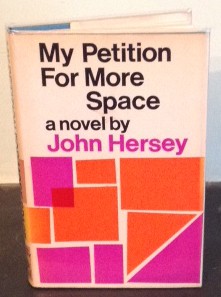Inspiring Older Readers
 posted on 13 Nov 2023
posted on 13 Nov 2023
My Petition For More Space by John Hersey
Dystopias come in all sorts of guises but are usually associated with some apocalyptic event that enables a totalitarian dictatorship to establish a hold over personal and political life. John Hersey foregoes this model however, opting instead for a world where a natural disaster has created its own particular nightmare vision – over-population.
Hersey is probably best known as the Pulitzer Prize winning journalist who produced the vivid post A-bomb vision of the world in his book Hiroshima. He was only thirty two years old when he wrote the book that would define his reputation but he was also a writer of substance and he went on to produce a significant body of work that has had too little attention paid to its later highlights. Published when he was sixty, My Petition For More Space, is, I think, one of his very best books but one very few people know.It was given to me on my birthday in 1978 – four years after its British release date – and it has stayed an important part of my library since.
So what's it all about? At some undated time in the future the world is so overcrowded that one of the most precious things to have is space. Writer of ‘reports’, Sam Poynter, lives in a world where anything you want has to be lobbied for by standing in a ‘waitline’ and presenting a petition to a hole in the wall behind which he presumes a ruling hierarchy waits to determine whether the lobbyist can get what they want.
Poynter, like everyone else, knows that it is futile – even dangerous – to petition for more space and so he keeps the nature of his petition to himself. He’s waiting, like everyone else, in a seemingly never ending queue to present his petition and these queues are intense affairs – ‘touchers’ he calls them – where people are so densely herded into line that they are physically squashed together.
Poynter allows himself to become infatuated by the mystery of the girl immediately in front of him – Maisie - with whom he slowly builds a relationship (or so he thinks). All the people around him have their own reasons for lobbying the authorities and we come to know something about the people Poynter takes a liking to and those he decides he dislikes for completely random and largely imaginary reasons.
A short book in which pretty much all the action takes place in a queue shuffling forward minutely for hours doesn’t sound like it’s going to be a winner but Hersey has pulled off a fabulous peep into a sort of private and public future hell. Poynter is a sad and disappointed man who is out of his proper time and place and we know that his attempt to challenge the ruling orthodoxy by claiming more space will inevitably fail. However, we are also oddly encouraged by his willingness to stay obliquely optimistic – his desire to find meaning and intimacy when real space and intimacy has been stolen from everyone is in itself a revolutionary act.
At the end of the book when the true nature of his petition has been played out with the faceless bureaucrats (who turn out to be computers), it would be easy to lose faith, to assume that dissent will always be crushed. However, Hersey allows Poynter to give us hope. He will return with a new petition – he could easily finish his reports on their due deadline but what if he simply asked for more time to do his work. He could take on the computer-bureaucrats again but this time he’ll plan his argument more carefully; next time, he resolves, he’ll win his petition but this time it will be for more time.
I'm not sure that the book is actually still in print at the moment - so I suspect you'll have to hunt for copies on the second hand market. However much of a fag that might be, I can assure you it's worth it.
Terry Potter
November 2023